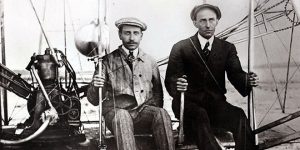5 Famous Moments of Genius
We have all had those moments. Those intense moments when a sudden gush of energy propels your brain into overdrive, creating a delightful mental sensation and voila; an idea is born or a solution to a problem is achieved. Some have termed this moment as the Eureka moment, named after a bathtub utterance by a certain gentleman.
Such a moment, which I like to call the ‘moment of genius’, is typically the culmination point following a series of ideas, research and study. During this moment of pure glory, everything suddenly makes sense and deeper insights into a sought after solution is achieved. The insights from some of these moments of genius have had long lasting applications, such as the theory of universal gravitation. Other such moments have served as moments of extreme joy upon the realization of a previously elusive idea. According to some accounts, Archimedes was so eager to share his eureka moment realization that he leapt out of his bathtub and ran through the streets of Syracuse naked.
[tie_slideshow]
[tie_slide]
Archimedes
It is fitting then that we begin our tally of the five famous moments of genius with none other but Archimedes. Archimedes is widely credited with the term eureka, an interjection regularly used in celebrating a sudden discovery. The word comes from the Greek word meaning “I have found it.” Archimedes found it when he stepped into a bathtub and noticed that the level of the water consequently rose. At this moment of genius, Archimedes suddenly understood that the volume of water displaced had to be equal to the volume of his submerged leg. This new discovery now meant that the volume of irregular objects cold be precisely calculated. More about Archimedes. [/tie_slide]
[tie_slide]
Isaac Newton
In 1666, while the University of Cambridge in England was closed due to a plague, Newton escaped to his family’s estate in Lincolnshire. It is here during a stroll around the farm that Isaac Newton observed an apple falling to the ground. It is said that this moment of genius evoked a myriad of questions in Newton’s mind, amongst them, why did the apple fall down instead of remaining suspended in the air? Following this experience the young Newton embarked on a quest to develop his theory of universal gravitation. Watch the story of science and how the likes of Isaac Newton shaped history.[/tie_slide]
[tie_slide]
Albert Einstein
In 1907, the 28-year-old Einstein was working in the patent office in Bern, Switzerland. According to his own account, one day a “breakthrough came suddenly”. Instead of keeping his mind on his work, his thoughts wandered to one idea that, “If a man falls freely he would not feel his weight.” Einstein’s response to his thought was immediate: “I was taken aback. This simple thought experiment made a deep impression on me.” By linking accelerated motion and gravity, Einstein eventually created his masterwork, the general theory of relativity. However, it took him eight years to work through the mathematical details. [/tie_slide]
[tie_slide]
Jules-Henri Poincaré
In a famous essay titled “Mathematical Creation,” the mathematician Poincaré recalled his moment of genius moment involving a particular kind of mathematical construct known as “Fuchsian functions.” For two weeks, Poincare had struggled to prove a particular property of these functions. Based on his account, he “tried a great number of combinations and reached no results.” A few days later he left his home in Caen, France, to join some colleagues on a geological excursion to Coutances, where he recalls boarding an omnibus. “At the moment when I put my foot on the step the idea came to me, without anything in my former thoughts seeming to have paved the way for it,” he wrote. “On my return to Caen, for conscience’s sake I verified the result at my leisure.” [/tie_slide]
[tie_slide]
Nikola Tesla
From the first time Nikola Tesla saw the demonstration of how a direct current (DC) circuit, he knew there had to be a better way. But he could never quite figure out what the suitable alternative would be. So one day he was out for a walk when it just came to him. He used his walking stick to draw a picture explaining how alternating current would work to his walking partner. Nikola developed the AC-current generation system which comprised of a motor and a transformer, making him arguably the greatest electrical engineer of all time. [/tie_slide]
[tie_slide]
3 More Moments of Genius
[/tie_slide]
[/tie_slideshow]




Hard to believe Einstein was still working at the patent office in 1907, two years after his five famous seminal papers were published in 1905. Perhaps the time element is wrong or someone made an assumption?
Dr. Russell,
We are checking into that. We will make the necessary changes if need be.
Thank you.
Ken.